Gravel VS Chip Seal – Choosing the Right Surface
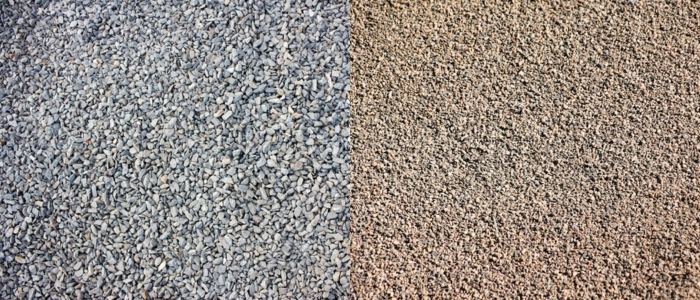
When it comes to choosing the best surface for your driveway or roadway, the decision between gravel vs chip seal can significantly impact your property’s functionality, longevity, and overall appeal. Each option offers unique benefits and trade-offs, depending on your budget, traffic levels, maintenance expectations, and aesthetic preferences.
Among the many affordable driveway options, gravel and chip seal are two of the most popular—particularly for rural properties, large driveways, or municipal roads where cost-effectiveness and performance matter. While gravel is often chosen for its low upfront cost and rustic appearance, chip seal provides a more durable, weather-resistant surface with a refined finish.
This article explores the key differences in gravel vs chip seal cost, installation process, durability, maintenance needs, curb appeal, and environmental impact. If you’re trying to determine which surface is right for your needs, read on—we’ll break down each factor to help you make an informed, confident choice.
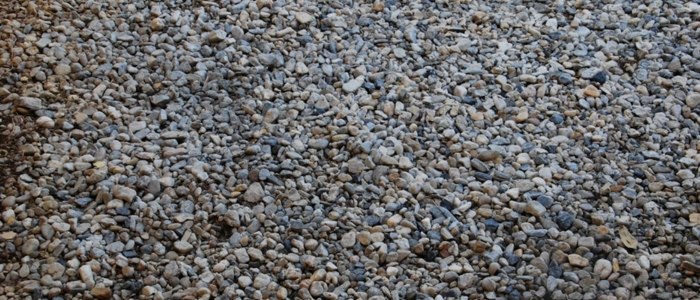
What is Gravel?
Gravel is a loose aggregate surface material made up of small stones, typically ranging from ¼ inch to 2 inches in diameter. It’s widely used for driveways, rural roads, and access paths due to its affordability, availability, and ease of installation. Often sourced locally, gravel can include crushed stone, natural pebbles, or quarry byproducts, depending on regional supply.
This surface type is especially popular for low-traffic areas and rural applications where minimal investment is preferred. It’s a go-to option in agricultural settings and large properties where covering long distances with asphalt or concrete may not be feasible.
Installing a gravel driveway typically involves grading the sub-base, applying a layer of geotextile fabric for weed prevention, and then layering and compacting the gravel. While the initial cost is significantly lower than most alternatives, including chip seal, it’s important to understand that long-term maintenance can offset some of those savings. For many property owners, gravel is considered one of the most affordable driveway options, especially when used as a temporary or transitional solution.
Though gravel lacks the bonding and weather resistance of a finished surface like chip seal, its ease of installation makes it attractive for quick project turnaround. Learn more about traditional alternatives like Macadam Driveways, which share some foundational similarities with gravel systems.
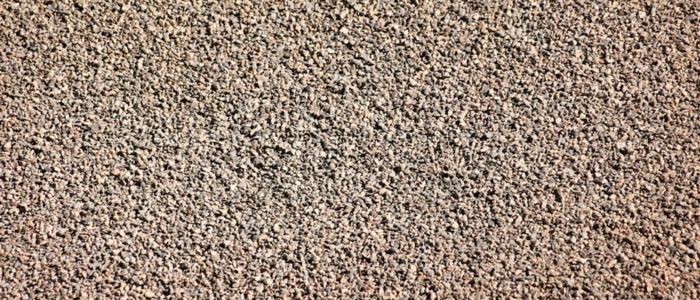
What is a Chip Seal?
Chip seal is a pavement surface treatment that combines a layer of liquid asphalt with a layer of stone aggregate to create a textured, bonded surface. Sometimes referred to as “oil and stone,” chip seal offers a durable, visually appealing alternative to loose gravel and a more affordable option compared to full asphalt paving.
The chip seal installation process begins with applying a hot liquid asphalt emulsion onto a prepared surface. While still tacky, a uniform layer of crushed stone or aggregate is spread over the top and compacted using heavy rollers. This process locks the stone into place, creating a sealed surface that’s both weather-resistant and skid-resistant.
Chip seal is commonly used for residential driveways, municipal roads, and commercial access routes where a combination of performance, aesthetics, and cost-efficiency is required. It’s especially effective in high-traffic rural areas, where gravel would quickly deteriorate or wash away.
Visually, chip seal delivers a natural yet refined appearance. Property owners can choose from a range of stone colors and sizes to customize the finish. This makes chip seal not only a functional solution but also one that enhances curb appeal.
To explore how chip seal works in more detail, visit our guide: How Chip Seal Paving Works.
Thinking About a New Chip Seal Driveway?
Request a Free Quote
Our team is ready to help you create a durable, beautiful surface that stands the test of time. Contact us today to learn more.
Cost Comparison
When evaluating gravel vs chip seal cost, it’s important to consider both the initial investment and the long-term financial implications. While gravel is often perceived as the most budget-friendly surface option, its recurring maintenance needs can add up over time. Chip seal, on the other hand, has a higher upfront cost but offers better value in terms of durability and reduced upkeep.
Initial Installation Costs
- Gravel typically costs less per square foot to install. It requires minimal materials and labor, making it attractive for large areas or temporary driveways.
- Chip Seal involves specialized equipment, skilled labor, and precise material application, which naturally raises the cost. However, it still remains significantly more affordable than full-depth asphalt or concrete paving.
Long-Term Value
Gravel driveways often need to be re-graded, replenished, or reshaped every season or after heavy storms. In contrast, chip seal surfaces can last 5 to 7 years before needing a new seal coat, resulting in lower maintenance frequency and cost. For an in-depth look at longevity, refer to: How Long Does Chipseal Last?
Value for Money
In a driveway surface comparison, chip seal tends to be the better investment for homeowners seeking a semi-permanent solution that offers aesthetic appeal and structural reliability. Over time, the lower maintenance demands and longer lifespan of chip seal can outweigh its higher installation cost, especially for frequently used driveways or roadways.
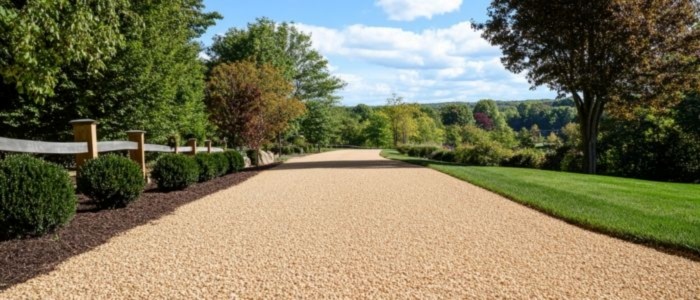
Durability and Weather Resistance
One of the most critical factors in choosing between gravel vs chip seal is how each surface performs under pressure—literally. From harsh New England winters to heavy vehicle traffic, driveways and roads need to withstand the elements and daily use without rapidly degrading.
Gravel surfaces, while economical, are inherently less stable. Because gravel isn’t bound to the subbase, it’s prone to rutting, washouts, and displacement over time. In wet conditions, gravel can erode quickly, creating potholes and drainage issues. Snow removal can also displace the stones, requiring frequent replenishment. For rural driveways or rarely traveled areas, this may be acceptable—but for high-traffic zones, it leads to consistent upkeep.
Chip seals, in contrast, offer greater durability and weather resistance. The liquid asphalt creates a waterproof barrier that seals the surface below, while the embedded stone aggregate adds traction and stability. This makes chip seals far more resilient against freeze-thaw cycles, heavy rains, and UV exposure. It also provides better structural integrity on sloped driveways or areas subject to frequent vehicle turning and braking.
In a chip seal vs gravel road scenario, chip seal clearly outperforms gravel in longevity, erosion control, and low-maintenance reliability—especially in challenging climates.
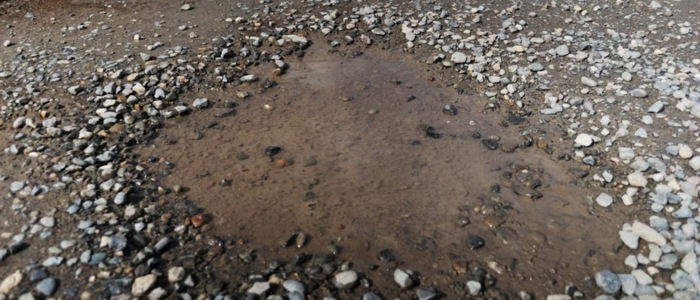
Maintenance Requirements
When deciding between gravel vs chip seal, one of the most practical considerations is long-term maintenance. The difference in upkeep frequency and effort can significantly influence the total cost of ownership.
Gravel Maintenance
A gravel driveway requires ongoing attention to stay functional and visually appealing. Homeowners should expect to:
- Regularly grade the surface to eliminate ruts and washboarding.
- Reapply gravel to replenish material lost due to erosion or snow removal.
- Implement weed control to manage growth between the stones.
- Apply dust suppressants in dry seasons to improve air quality and visibility.
According to the PennDOT LTAP Program, even well-constructed gravel roads require seasonal maintenance, especially in areas with heavy rainfall or frequent freeze-thaw cycles. Additionally, the EPA notes that gravel roads contribute to sediment runoff, making them a less eco-friendly option in certain environments.
Chip Seal Maintenance
Chip seal driveways require much less frequent maintenance, offering a major advantage over gravel. Once installed, you’ll typically only need to:
- Sweep away loose aggregate shortly after installation.
- Reseal the surface every 5–7 years, depending on use and weather.
- Perform minor patching, far less frequently than with gravel.
The Federal Highway Administration (FHWA) lists chip seal as a key tool in pavement preservation, extending roadway life while keeping maintenance costs low. For installation and care insights, visit our guide on chip seal driveway maintenance.
Long-Term Care Considerations
When it comes to durable driveway surfaces, chip seal offers significantly more longevity and ease of care. If you’re looking to minimize long-term maintenance, it’s often the better choice for both residential and commercial applications.
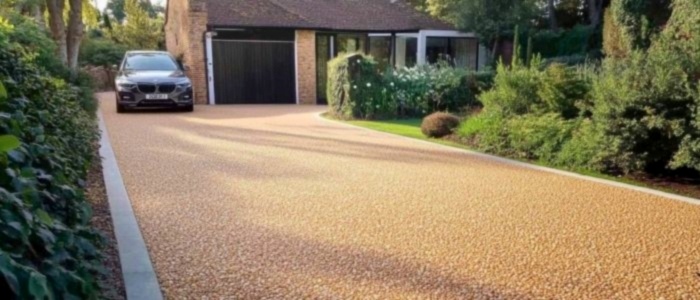
Aesthetic and Curb Appeal
When it comes to curb appeal, the surface material of your driveway or roadway can make a powerful first impression. Both gravel and chip seal offer distinct visual characteristics, but they differ significantly in refinement and finish.
Gravel’s Natural, Rustic Look
Gravel driveways are known for their rustic charm. The loose stone creates a natural, informal appearance that suits rural homes, farm properties, and landscapes aiming for a country-style aesthetic. However, gravel can scatter over time, leading to an uneven surface and a less polished appearance. This may detract from curb appeal, especially in more formal or suburban settings.
While gravel color options vary depending on local sources, customization is generally limited compared to other surfacing methods.
Chip Seal’s Refined, Custom Finish
Chip seal driveways, on the other hand, provide a more structured and attractive look. The embedded stone chips sit atop a smooth layer of asphalt emulsion, creating a solid, textured finish that’s both eye-catching and highly functional.
With chip seal, property owners can choose from various aggregate colors and sizes, allowing for a customized surface that complements the architectural style of the home or landscape. This not only improves visual appeal but can also enhance property value over time.
Explore more about the benefits of chip seal driveways in our guide: Chip Seal Driveway Benefits
Which Has More Curb Appeal?
For homeowners prioritizing aesthetics, chip seal is often the better choice. It delivers the clean lines and uniform texture many associate with higher-end surfaces, while still offering the cost efficiency of gravel.
To see a comparison in action, read our full article on Chip Seal vs Asphalt, which further explores chip seal’s aesthetic advantages.
Environmental Impact
Environmental considerations are becoming increasingly important when selecting materials for driveways and roadways. From erosion control to resource usage, both gravel and chip seal offer unique environmental impacts worth evaluating.
Environmental Considerations for Gravel
While gravel is a natural material, it has some notable drawbacks from an ecological standpoint. Loose aggregate surfaces are prone to dust generation, which can reduce air quality and negatively affect nearby vegetation. Additionally, gravel erosion is common, especially on sloped or high-traffic driveways. This can result in sediment runoff, contributing to water pollution and drainage issues.
According to the U.S. Environmental Protection Agency (EPA), unpaved gravel roads are one of the primary contributors to sediment in nearby waterways, particularly in rural areas.
Weed growth and vegetation management often require the use of herbicides on gravel surfaces, further impacting the surrounding ecosystem.
Chip Seal’s Sustainability Advantages
Chip seal surfaces, while requiring manufactured asphalt emulsion, offer several eco-friendly advantages:
- The surface is sealed, preventing dust and sediment from escaping into the environment.
- The materials used—such as recycled asphalt and local stone—can reduce the need for virgin resources.
- The longer lifespan and reduced maintenance means fewer emissions from machinery over time.
In many municipal and state-level sustainability initiatives, chip seal is recognized as part of a pavement preservation strategy that prolongs road life without requiring full-depth reconstruction. The Federal Highway Administration (FHWA) supports chip seal as a low-impact, cost-effective method for managing road networks responsibly.
At New England Asphalt, we are committed to sustainable paving practices—utilizing high-quality materials and efficient processes to minimize waste and environmental disruption.
Which Is Greener?
While gravel is natural and easily sourced, it lacks the environmental controls chip seal offers. For projects seeking reduced runoff, dust, and long-term resource efficiency, chip seal is typically the more sustainable option.
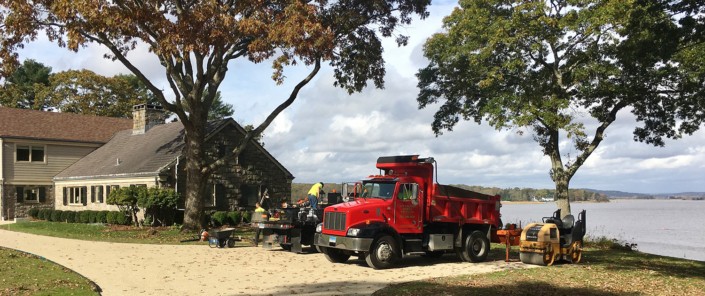
Frequently Asked Questions (FAQs)
Yes, chip seal is typically the better option for long driveways due to its superior durability, weather resistance, and lower maintenance requirements. While gravel may offer lower initial costs, it often demands frequent regrading and replacement, especially over extended or sloped areas.
A professionally installed chip seal driveway can last 5 to 7 years before resealing is needed, with many surfaces lasting even longer. Gravel driveways, by contrast, often require annual maintenance, including grading, weed control, and material replenishment. For more, see: How Long Does Chipseal Last?
Yes, upgrading from gravel to chip seal is a common and effective improvement. If the existing gravel base is stable and properly graded, it can often serve as the foundation for chip seal installation. Contact New England Asphalt for a site evaluation to determine if your driveway is ready for resurfacing.
Yes. Chip seal is considered more sustainable than many traditional paving methods. It helps control dust and sediment runoff, often utilizes recycled materials, and extends the life of existing roads without the need for full reconstruction. Refer to the Environmental Impact section for details.
If you’re only considering initial installation costs, gravel is usually the most affordable option. However, for long-term value and reduced maintenance, chip seal often proves to be the more cost-effective solution, especially for driveways that endure regular traffic or harsh weather.
Expert Recommendation
When weighing the options in the gravel vs chip seal debate, the best choice ultimately depends on your project’s purpose, budget, and long-term goals. The following table highlights key decision factors to help you choose the most appropriate surface:
| Criteria | Gravel | Chip Seal |
| Upfront Cost | Low | Moderate (less than asphalt) |
| Long-Term Cost | High (due to frequent maintenance) | Lower (fewer repairs, reseals every 5–7 years) |
| Durability | Moderate (prone to erosion and displacement) | High (sealed surface resists weather and traffic wear) |
| Maintenance Requirements | Frequent (grading, replenishment, weed control) | Minimal (periodic sweeping and resealing) |
| Aesthetic Appeal | Rustic, informal | Clean, textured, customizable appearance |
| Traffic Suitability | Light traffic | Ideal for moderate to heavy traffic |
| Weather Resistance | Poor (easily affected by rain and snow) | Strong (sealed surface prevents water intrusion) |
| Best Use Cases | Temporary, rural access roads | Permanent driveways, sloped terrain, municipal surfaces |
| Environmental Impact | Higher dust, erosion, sediment runoff | Reduced dust and runoff, can use recycled materials |
Our Professional Opinion
While gravel is suitable for temporary or low-traffic use, chip seal is the preferred choice for property owners looking for a durable, attractive, and low-maintenance surface that holds up to New England’s demanding weather conditions.
Thinking About a New Chip Seal Driveway?
Request a Free Quote
Our team is ready to help you create a durable, beautiful surface that stands the test of time. Contact us today to learn more.
Why Choose New England Asphalt
At New England Asphalt, we bring over 75 years of specialized experience in chip seal driveway installation, maintenance, and resurfacing. Whether you’re a homeowner, business owner, or municipal planner, our team delivers cost-effective solutions that balance performance with curb appeal.
To learn more, explore our service areas:



